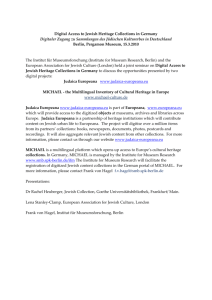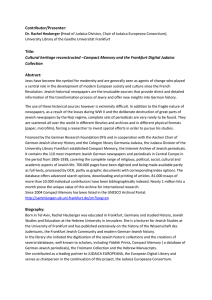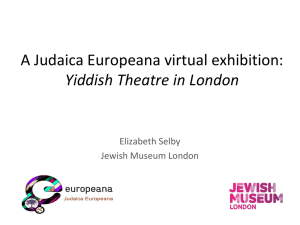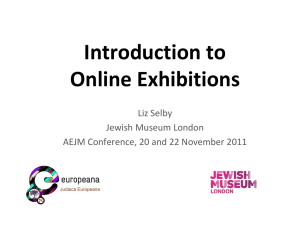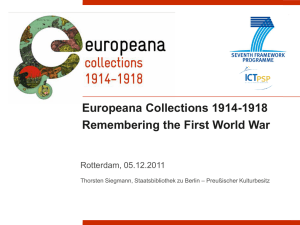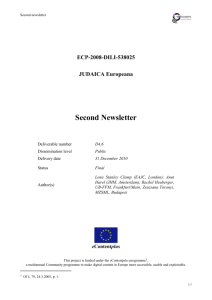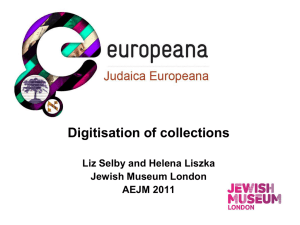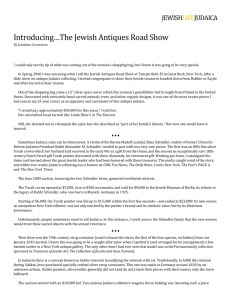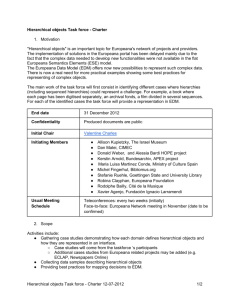Workshop on Digital Humanities
advertisement
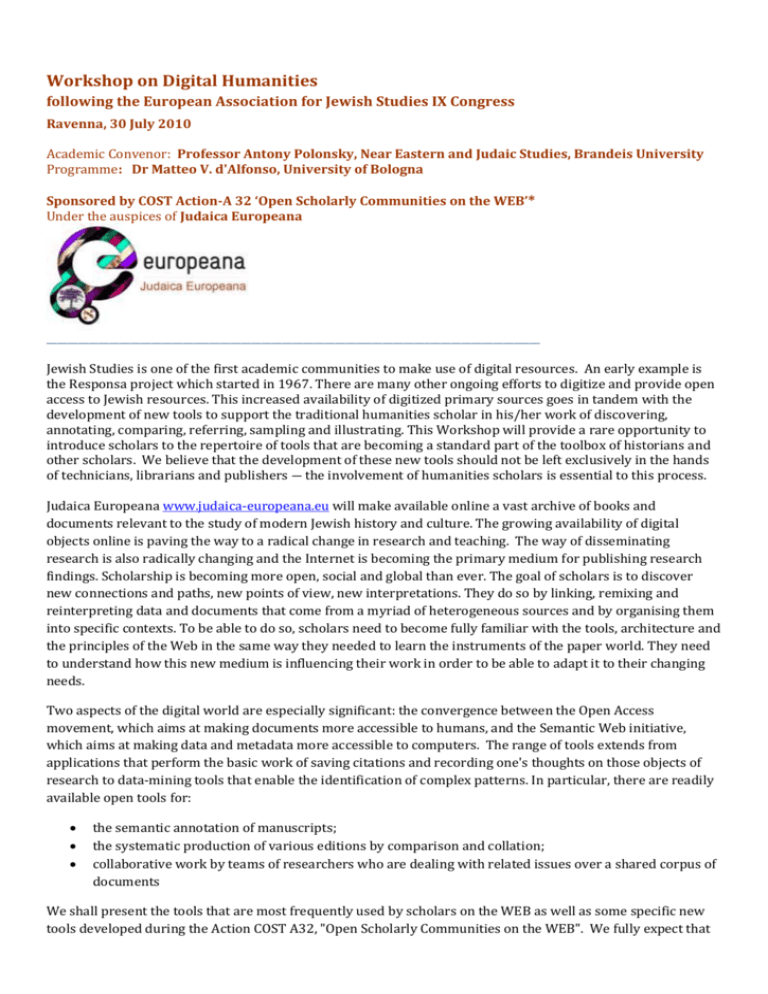
Workshop on Digital Humanities following the European Association for Jewish Studies IX Congress Ravenna, 30 July 2010 Academic Convenor: Professor Antony Polonsky, Near Eastern and Judaic Studies, Brandeis University Programme: Dr Matteo V. d'Alfonso, University of Bologna Sponsored by COST Action-A 32 ‘Open Scholarly Communities on the WEB’* Under the auspices of Judaica Europeana ______________________________________________________________________________________________ Jewish Studies is one of the first academic communities to make use of digital resources. An early example is the Responsa project which started in 1967. There are many other ongoing efforts to digitize and provide open access to Jewish resources. This increased availability of digitized primary sources goes in tandem with the development of new tools to support the traditional humanities scholar in his/her work of discovering, annotating, comparing, referring, sampling and illustrating. This Workshop will provide a rare opportunity to introduce scholars to the repertoire of tools that are becoming a standard part of the toolbox of historians and other scholars. We believe that the development of these new tools should not be left exclusively in the hands of technicians, librarians and publishers ― the involvement of humanities scholars is essential to this process. Judaica Europeana www.judaica-europeana.eu will make available online a vast archive of books and documents relevant to the study of modern Jewish history and culture. The growing availability of digital objects online is paving the way to a radical change in research and teaching. The way of disseminating research is also radically changing and the Internet is becoming the primary medium for publishing research findings. Scholarship is becoming more open, social and global than ever. The goal of scholars is to discover new connections and paths, new points of view, new interpretations. They do so by linking, remixing and reinterpreting data and documents that come from a myriad of heterogeneous sources and by organising them into specific contexts. To be able to do so, scholars need to become fully familiar with the tools, architecture and the principles of the Web in the same way they needed to learn the instruments of the paper world. They need to understand how this new medium is influencing their work in order to be able to adapt it to their changing needs. Two aspects of the digital world are especially significant: the convergence between the Open Access movement, which aims at making documents more accessible to humans, and the Semantic Web initiative, which aims at making data and metadata more accessible to computers. The range of tools extends from applications that perform the basic work of saving citations and recording one's thoughts on those objects of research to data-mining tools that enable the identification of complex patterns. In particular, there are readily available open tools for: the semantic annotation of manuscripts; the systematic production of various editions by comparison and collation; collaborative work by teams of researchers who are dealing with related issues over a shared corpus of documents We shall present the tools that are most frequently used by scholars on the WEB as well as some specific new tools developed during the Action COST A32, "Open Scholarly Communities on the WEB". We fully expect that the acquaintance of Jewish Studies scholars with this repertoire will increase their creativity and facilitate their work greatly. This outcome will be one of the best justifications for the extraordinary efforts and resources applied in the digitization initiatives of Jewish heritage. A number of grants designed to cover the cost of one night’s accommodation in Ravenna will be awarded by Judaica Europeana to postgraduate scholars in modern history, who wish to participate in the Workshop. Applications should be sent to Lena Stanley-Clamp at contact.judaica.europeana@gmail.com explaining how you expect to use digital tools in your research and enclosing your CV. PROGRAMME 9.00 Welcome and introduction Judaica Europeana: A New Digital Archive for Jewish Studies Dov Winer, Scientific Manager, Judaica Europeana, European Association for Jewish Culture Dr Rachel Heuberger, Judaica Collection, Goethe University Library, Frankfurt/Main 9.15 How Linked Data and the Semantic Web Are Changing Scholarship Michele Barbera, Net7 – Pisa / COST A32 Open Scholarly Communities on the Web Discussion 10.15 Everyday Digital Scholarship: Using Web-Based Tools for Research An overview of scholarly search engines, tools for collaborative bibliography, dissemination and impact factor Dr Francesca Di Donato, University of Pisa Q&A 11.15 Managing Your Project in Digital Humanities A quick start guide for setting up an Open Scholarly Community on the Web Dr Matteo V. d'Alfonso, University of Bologna Q&A 12.15 Teaching on the Web. Panmind as E-Learning Environment for Higher Education Professor Roberto d'Autilia, University of Rome 13.20 Conclusions and next steps 13.30 Lunch COST (Co-operation in the field of Scientific and Technical Research) is an intergovernmental European framework for international cooperation between nationally funded research activities. COST creates scientific networks and enables scientists to collaborate in a wide spectrum of activities in research and technology. Open Scholarly Communities on the Web www.cost-a32.eu is a COST Action, which is dedicated to creating a research infrastructure for humanities scholarship on the Web and an advanced e-learning system for graduate students and young researchers. Judaica Europeana www.judaica-europeana.eu is one of the targeted digital projects funded by the European Commission for the flagship EU project Europeana, Europe’s digital library. Judaica Europeana is a partnership of research libraries, archives and museums in seven European countries whose aim is to provide open access to Jewish collections and to stimulate research.
